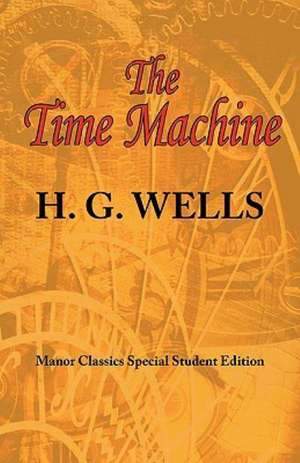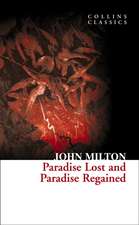The Time Machine
Autor H. G. Wellsen Limba Engleză Paperback – 20 mai 2010
Vezi toate premiile Carte premiată
Audies (2014)
Preț: 55.17 lei
Nou
Puncte Express: 83
Preț estimativ în valută:
10.56€ • 10.88$ • 8.91£
10.56€ • 10.88$ • 8.91£
Carte tipărită la comandă
Livrare economică 01-15 martie
Preluare comenzi: 021 569.72.76
Specificații
ISBN-13: 9781604504774
ISBN-10: 1604504773
Pagini: 108
Dimensiuni: 140 x 216 x 7 mm
Greutate: 0.15 kg
Editura: ARC MANOR
ISBN-10: 1604504773
Pagini: 108
Dimensiuni: 140 x 216 x 7 mm
Greutate: 0.15 kg
Editura: ARC MANOR
Notă biografică
Herbert George Wells (1866 - 1946)-known as H. G. Wells-was a prolific English writer in many genres, including the novel, history, politics and social commentary, as well as textbooks and rules for war games. Wells is now best remembered for his science fiction novels and is called the father of science fiction, along with Jules Verne and Hugo Gernsback. His most notable science fiction works include The Time Machine (1895), The Island of Doctor Moreau (1896), The Invisible Man (1897) and The War of the Worlds (1898). He was nominated for the Nobel Prize in Literature four times.
Descriere
Descriere de la o altă ediție sau format:
'So, in the end, above ground you must have the Haves, pursuing pleasure and comfort and beauty, and below ground the Have-nots, the Workers...'At a Victorian dinner party, in Richmond, London, the Time Traveller returns to tell his extraordinary tale of mankind's future in the year 802,701 AD. It is a dystopian vision of Darwinian evolution, with humans split into an above-ground species of Eloi, and their troglodyte brothers. The first book H. G. Wells published, The Time Machine is a scientific romance that helped invent the genre of science fiction and the time travel story. Even before its serialisation had finished in the spring of 1895, Wells had been declared 'a man of genius', and the book heralded a fifty year career of a major cultural and political controversialist. It is a sardonic rejection of Victorian ideals of progress and improvement and a detailed satirical commentary on the Decadent culture of the 1890s.This edition features a contextual introduction, detailed explanatory notes, and two essays Wells wrote just prior to the publication of his first book.
'So, in the end, above ground you must have the Haves, pursuing pleasure and comfort and beauty, and below ground the Have-nots, the Workers...'At a Victorian dinner party, in Richmond, London, the Time Traveller returns to tell his extraordinary tale of mankind's future in the year 802,701 AD. It is a dystopian vision of Darwinian evolution, with humans split into an above-ground species of Eloi, and their troglodyte brothers. The first book H. G. Wells published, The Time Machine is a scientific romance that helped invent the genre of science fiction and the time travel story. Even before its serialisation had finished in the spring of 1895, Wells had been declared 'a man of genius', and the book heralded a fifty year career of a major cultural and political controversialist. It is a sardonic rejection of Victorian ideals of progress and improvement and a detailed satirical commentary on the Decadent culture of the 1890s.This edition features a contextual introduction, detailed explanatory notes, and two essays Wells wrote just prior to the publication of his first book.
Recenzii
“[Wells] contrives to give over humanity into the clutches of the Impossible and yet manages to keep it down (or up) to its humanity, to its flesh, blood, sorrow, folly.” —Joseph Conrad
Caracteristici
Part of H.G. Wells new collection to include The Invisible Man and The War of the Worlds
Textul de pe ultima copertă
In The Time Machine Wells pioneers the concept of travel in the 'Fourth Dimension' and speculates about the ultimate decay of the human species. The world of the effete Eloi and ape-like Morlocks, the age of giant crabs, and the final portrayal of the heat-death of the sun constitute an unforgettable vision of the future. The Time Traveller's narrow escape from the remote descendants of humanity is paralleled by Edward Prendick's horrifying adventures among the Beast Folk of The Island of Doctor Moreau. Moreau, a ruthless vivisector, chooses an uninhabited Pacific island for his attempts to change animals into human beings on the operating table. Prendick soon fears that he, too, may become a victim of Moreau's experiments. Even at their most bleakly pessimistic and ironic, these stories testify to the resources of human courage and ingenuity. This edition offers authoritative texts of both novels, explanatory notes, and an introduction setting them in the context of Wells's life and thought.
Premii
- Audies Finalist, 2014















![Chemistry: Getting a Big Reaction! [With Poster]](https://i3.books-express.ro/bt/9780753464137/chemistry.jpg)








